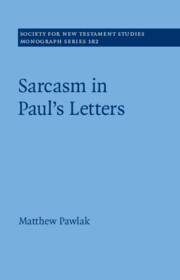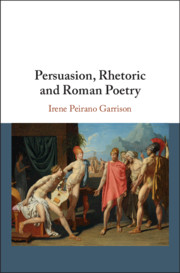Refine search
Actions for selected content:
38 results
1 - Definition, Division, and Difference
- from Part I - The Concepts
-
- Book:
- The State in Machiavelli
- Published online:
- 29 December 2025
- Print publication:
- 31 January 2026, pp 29-70
-
- Chapter
- Export citation
Chapter 7 - Appearing in Court
-
- Book:
- The State, the Law, and the People in the Roman Empire
- Published online:
- 11 December 2025
- Print publication:
- 11 December 2025, pp 347-412
-
- Chapter
- Export citation
Homer in Irenaeus
-
- Journal:
- Harvard Theological Review / Volume 118 / Issue 2 / April 2025
- Published online by Cambridge University Press:
- 30 July 2025, pp. 264-284
- Print publication:
- April 2025
-
- Article
-
- You have access
- Open access
- HTML
- Export citation
Chapter Six - Finalities and Florence
-
- Book:
- Leon Battista Alberti in Exile
- Published online:
- 07 February 2025
- Print publication:
- 06 March 2025, pp 317-336
-
- Chapter
- Export citation
Chapter 3 - Ancient Histories of Satire(s)
- from Part I - Between Literature and Scholarship
-
-
- Book:
- Writing Literary History in the Greek and Roman World
- Published online:
- 07 June 2024
- Print publication:
- 27 June 2024, pp 62-84
-
- Chapter
- Export citation
Chapter 11 - Progress and Decline in Roman Perspectives on Literary History
- from Part III - Narratives of Change
-
-
- Book:
- Writing Literary History in the Greek and Roman World
- Published online:
- 07 June 2024
- Print publication:
- 27 June 2024, pp 237-260
-
- Chapter
- Export citation
Chapter 2 - Intertextuality in Pliny, Epistles 6
- from Part I - Intertextuality and Interdiscursivity in Pliny’s Letters
-
-
- Book:
- Intertextuality in Pliny's <i>Epistles</i>
- Published online:
- 07 September 2023
- Print publication:
- 21 September 2023, pp 47-66
-
- Chapter
- Export citation
Chapter 10 - Triclinium Theatricality
-
- Book:
- Living Theatre in the Ancient Roman House
- Published online:
- 22 December 2022
- Print publication:
- 12 January 2023, pp 426-483
-
- Chapter
- Export citation
Chapter 5 - Theatricalism and the Roman House
-
- Book:
- Living Theatre in the Ancient Roman House
- Published online:
- 22 December 2022
- Print publication:
- 12 January 2023, pp 151-205
-
- Chapter
- Export citation
Chapter 2 - Imagining Purity
-
- Book:
- Rome and America
- Published online:
- 22 December 2022
- Print publication:
- 05 January 2023, pp 58-95
-
- Chapter
- Export citation

Sarcasm in Paul’s Letters
-
- Published online:
- 15 December 2022
- Print publication:
- 22 December 2022
Chapter 1 - Hamlet’s Advice to the Players
-
- Book:
- The Players' Advice to Hamlet
- Published online:
- 16 January 2020
- Print publication:
- 06 February 2020, pp 10-37
-
- Chapter
- Export citation
Chapter 2 - Rhetorical Performance in Antiquity
-
- Book:
- The Players' Advice to Hamlet
- Published online:
- 16 January 2020
- Print publication:
- 06 February 2020, pp 38-69
-
- Chapter
- Export citation
Introduction
-
- Book:
- The Rhetoric of Free Speech in Late Antiquity and the Early Middle Ages
- Published online:
- 23 September 2019
- Print publication:
- 26 September 2019, pp 1-18
-
- Chapter
- Export citation
Part I - Poetry in Rhetoric
-
- Book:
- Persuasion, Rhetoric and Roman Poetry
- Published online:
- 08 August 2019
- Print publication:
- 22 August 2019, pp 7-132
-
- Chapter
- Export citation
Chapter 3 - The Orator and the Poet in Quintilian’s Institutio Oratoria
- from Part I - Poetry in Rhetoric
-
- Book:
- Persuasion, Rhetoric and Roman Poetry
- Published online:
- 08 August 2019
- Print publication:
- 22 August 2019, pp 88-132
-
- Chapter
- Export citation

Persuasion, Rhetoric and Roman Poetry
-
- Published online:
- 08 August 2019
- Print publication:
- 22 August 2019
Chapter 6 - On Length, in Brief (Ep. 1.20)
-
- Book:
- The Arts of Imitation in Latin Prose
- Published online:
- 10 June 2019
- Print publication:
- 27 June 2019, pp 192-248
-
- Chapter
- Export citation
Chapter 3 - Brief Encounters
-
- Book:
- The Arts of Imitation in Latin Prose
- Published online:
- 10 June 2019
- Print publication:
- 27 June 2019, pp 69-107
-
- Chapter
- Export citation
Chapter 9 - Docendo discitur
-
- Book:
- The Arts of Imitation in Latin Prose
- Published online:
- 10 June 2019
- Print publication:
- 27 June 2019, pp 323-352
-
- Chapter
- Export citation
